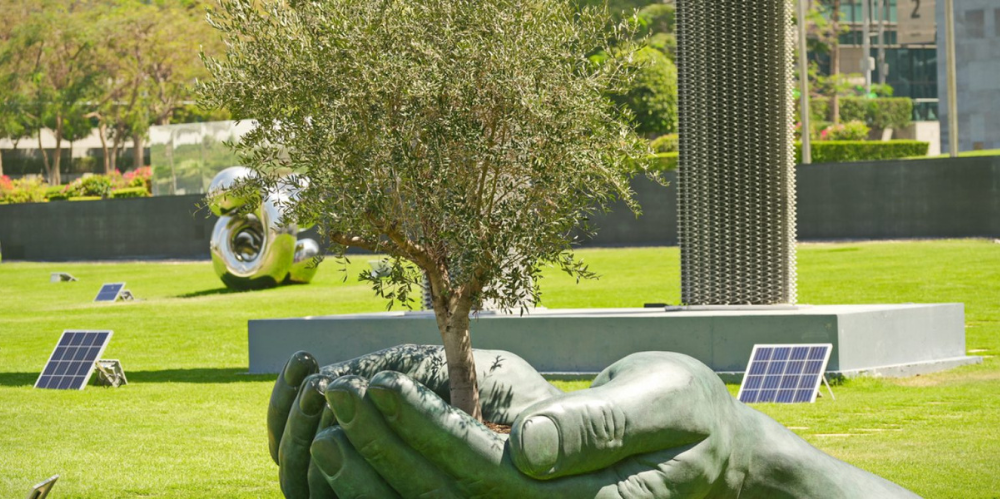Industry topics
Upcoming events
Lifelong learning

Claim your CPD points
I was honoured to once again represent the global actuarial profession (and, of course, the Institute) at the recently concluded 28th Conference of the Parties to the UN Framework Convention on Climate Change (COP28) in Dubai, United Arab Emirates (UAE).

COP28 slogans to motivate delegates
While the media’s main focus has been on the nuances of the wording in the final agreement, there was much more going on at COP than global leaders and diplomats hashing out commitments.
The meeting’s other main activity, providing a forum for the world’s leading experts in climate science, technology, public policy, and finance to gather, present reports and exchange ideas, was in fact the main focus of the International Actuarial Association’s (IAA) delegation.
COP28 continued incremental progress towards controlling global warming through decarbonisation policies including the first global stock-take, which countries can use to develop stronger climate action plans, which will require a cut of 43% in greenhouse gas emissions by 2030 (relative to 2019) to limit warming to 1.5C.
Agreements called for tripling of renewable energy and doubling energy efficiency. There was also a call for a “phase down” of unabated coal power, phasing out fossil fuel subsidies, and a transition away from fossil fuels in an orderly manner. Climate finance was also a focus, particularly on adaptation.
It was interesting to observe that COP28 occurred in a country that has grown rich on fossil fuels, and just as interestingly, the COP28 President is also the Chief Executive of the UAE’s national oil and gas company, ADNOC.
Predictably, many governments touted the agreements reached as historic while most environmentalists were highly critical of a perceived lack of commitments to rapidly phase out fossil fuels.
The IAA team, consisting of myself and Simon Curtis of Canada, focused on meeting various experts, attending sessions on science and decarbonisation, and introducing people to the profession. COP28’s focus on climate finance provided an excellent opportunity for us to highlight how actuaries support the financial services industry and where our skills in risk management and extreme events, among other things, can make a substantial contribution.

Rade at COP28
A particular area of focus for us was to meet and build relationships with the new IPCC teams that will undertake the 7th Assessment. The IPCC refreshes its scientific teams for each assessment cycle, making it important to meet the new scientists as each one begins. We have had good success working with the IPCC in recent years, as evidenced by the joint IAA-IPCC Summary for Actuaries report summarising the AR6 Working Group I findings.

Fossil fuel infrastructure in Dubai
This year’s COP was set up with a thematic program, with each day’s activities focused on a specific topic, including a World Climate Action Summit, health, finance, trade, energy, just transition, urban issues, youth, education, nature, oceans, food, and agriculture. This shows the breadth of discussions at COP and how much more than just emissions and warming are discussed.
Financial reporting and the International Sustainability Standards Board (ISSB) were also prominent. The ISSB disclosure standards S1 and S2 have gained huge traction over the past 24 months, being widely endorsed by bodies ranging from the International Organisation of Securities Commissions (IOSCO) to the Group of Twenty Financial Sustainability Board (G20 FSB).

A green hydrogen presentation at the Australia pavilion
Attention is now turning to the next phase, which is likely to be nature-based. A key gap and area of concern is the effective monitoring of transition plans, as there are currently limited ways to assess whether companies have credible plans to achieve their sustainability targets and to measure their progress against them.
A recurring theme in many conversations was the significant shortage of qualified experts in relevant fields, particularly in emerging economies such as Africa. Every conversation that we had with African leaders about the insurance space identified a huge shortfall of knowledgeable professionals with actuarial or risk management expertise in climate change and sustainability. This may represent an opportunity for the Institute to contribute through sharing learning resources.
Globally, technical expertise to work on sustainability disclosures and broader risk management are also in short supply. This illustrates the potential for actuaries to develop capabilities and expand employment opportunities.

“Pollution Pods” which simulate the outdoor air in cities around the world, like Delhi
Australia was represented at COP28 by a range of technical experts from the Bureau of Meteorology (BoM), the Department of Climate Change, Energy, the Environment and Water (DCCEEW), Commonwealth Scientific and Industrial Research Organisation (CSIRO) and other agencies.
Sessions at the Australian pavilion included topics such as Australia’s opportunity to become a sustainability superpower through clean energy and mineral extraction, plus the potential for green hydrogen. An Australian scientist from BoM led the WMO session on the state of the climate, while someone from DCCEEW was featured in an electric vehicle session at the Korean pavilion.
Overall, the IAA delegation was able to make valuable contacts, introduce new people to the profession, and participate in a range of discussions on climate and sustainability.